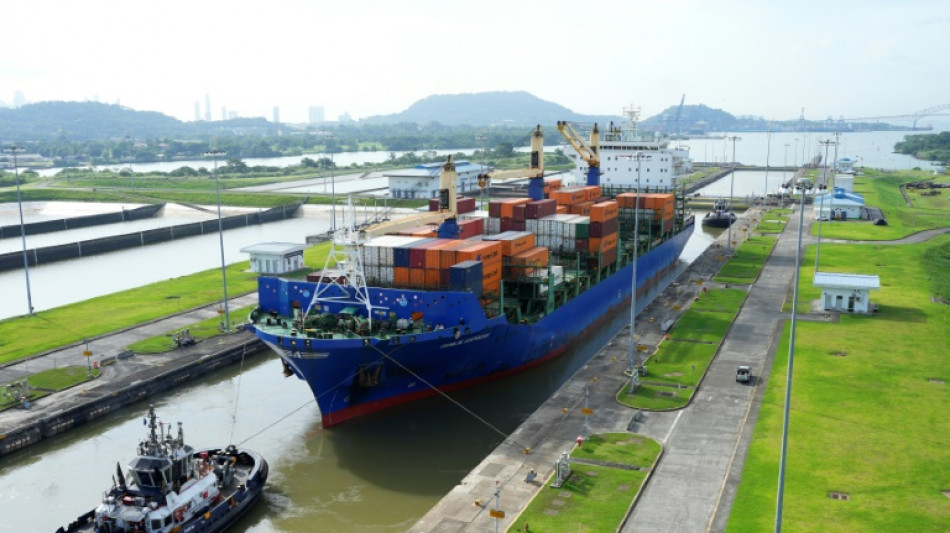
RBGPF
1.0200


China's fury at the sale of Panama Canal ports to a US-led consortium reflects how container hubs have become prized currency as Beijing and Washington vie for global influence, analysts say.
Hong Kong conglomerate CK Hutchison this month sold 43 ports in 23 countries -- including operations in the vital Central American canal -- to a group led by giant asset manager BlackRock for $19 billion in cash.
After two weeks of rhetoric, Beijing hardened its response on Friday and confirmed that antitrust regulators will review the deal, likely preventing the parties from signing an agreement on April 2 as planned.
Speaking before the review was announced, experts told AFP that the deal allowed US President Donald Trump to claim credit for "taking back" the canal as part of his "America First" agenda.
"The US (created) a political issue at China's expense and then has been able to declare victory," said Kurt Tong, managing partner at The Asia Group and a former top US diplomat to Hong Kong.
"That doesn't feel good in Beijing."
Some of the ports being sold are in nations that participate in Beijing's Belt and Road Initiative (BRI) -- a global development framework championed by Chinese President Xi Jinping.
Ports are crucial to that network and China "has been notably successful in this area", said Henry Gao, a trade law expert at the Singapore Management University.
Last month, Panama formally exited the BRI following a visit from US Secretary of State Marco Rubio.
"There is indeed a growing trend of 'weaponising' ports and trade infrastructure as tools of geopolitical leverage," Gao said.
- 'Nightmare' scenario? -
On March 4, CK Hutchison sent shockwaves through China's shipping industry by announcing a deal of "unprecedented scale", according to Xie Wenqing, a port development researcher at the Shanghai International Shipping Institute.
Chinese shipping firms questioned whether they could ensure neutral passage once the ports changed hands, he told AFP.
"There are concerns about additional costs for Chinese ships or discriminatory treatment in terms of queuing orders," he added, highlighting the long-arm jurisdiction of US authorities.
The deal -- coupled with recent US tariff hikes -- could undermine China's manufacturing dominance, argued Wang Yiwei, director of the Institute of International Affairs at the Renmin University of China.
"Increased inspections and additional docking costs would erode China's competitive edge and disrupt global supply chains," he noted.
The United States has used various justifications to target key infrastructure projects under the Belt and Road Initiative "to strip away these assets and weaken China's position as the world's factory", Wang added.
John Bradford, executive director of the Yokosuka Council on Asia-Pacific Studies, said the deal would not serve China's interests but said some concerns were "overblown".
Port operators such as CK Hutchison are commercial entities constrained by law and cannot decide matters of national sovereignty, for example whether a ship could visit a port or not.
"If (operators) were to blatantly favour one company over another, that would generally speaking... be illegal," Bradford said.
"Most countries have laws which say you have to treat different customers similarly, so the nightmare scenarios are not particularly realistic."
- Hong Kong's role -
Beijing's next steps in scrutinising CK Hutchison may also have far-reaching implications on Hong Kong and its role as China's business gateway to the world, according to analysts.
"This whole Panama ports issue has refocused attention on the question (of) whether Hong Kong is a good place to put assets or to do business," said Tong, the former diplomat.
"Certainly the foreign business community operating in Hong Kong is watching this issue very closely."
CK Hutchison is registered in the Cayman Islands and the assets being sold are all outside China.
That did not stop the State Administration for Market Regulation from announcing the antitrust review on Friday.
Jet Deng, a senior partner at the Beijing office of law firm Dentons, said China's antitrust laws can be applicable outside its borders, similar to those of the United States and the European Union.
Once a deal meets China's reportability threshold, a declaration is required even if the transaction takes place abroad, as long as the parties involved had substantial operations in mainland China, he said.
Firms that fail to declare may be fined for up to 10 percent of their operating income from the preceding year, Deng added.
Hung Ho-fung, a political scientist at Johns Hopkins University, said Beijing risks spooking "cautious" foreign firms that have already lowered their business exposure in Hong Kong.
If the deal crumbles under Chinese pressure, people may believe that Hong Kong is converging with mainland China where "national security considerations are of utmost importance in any business deal", Hung said.
T.Wu--ThChM